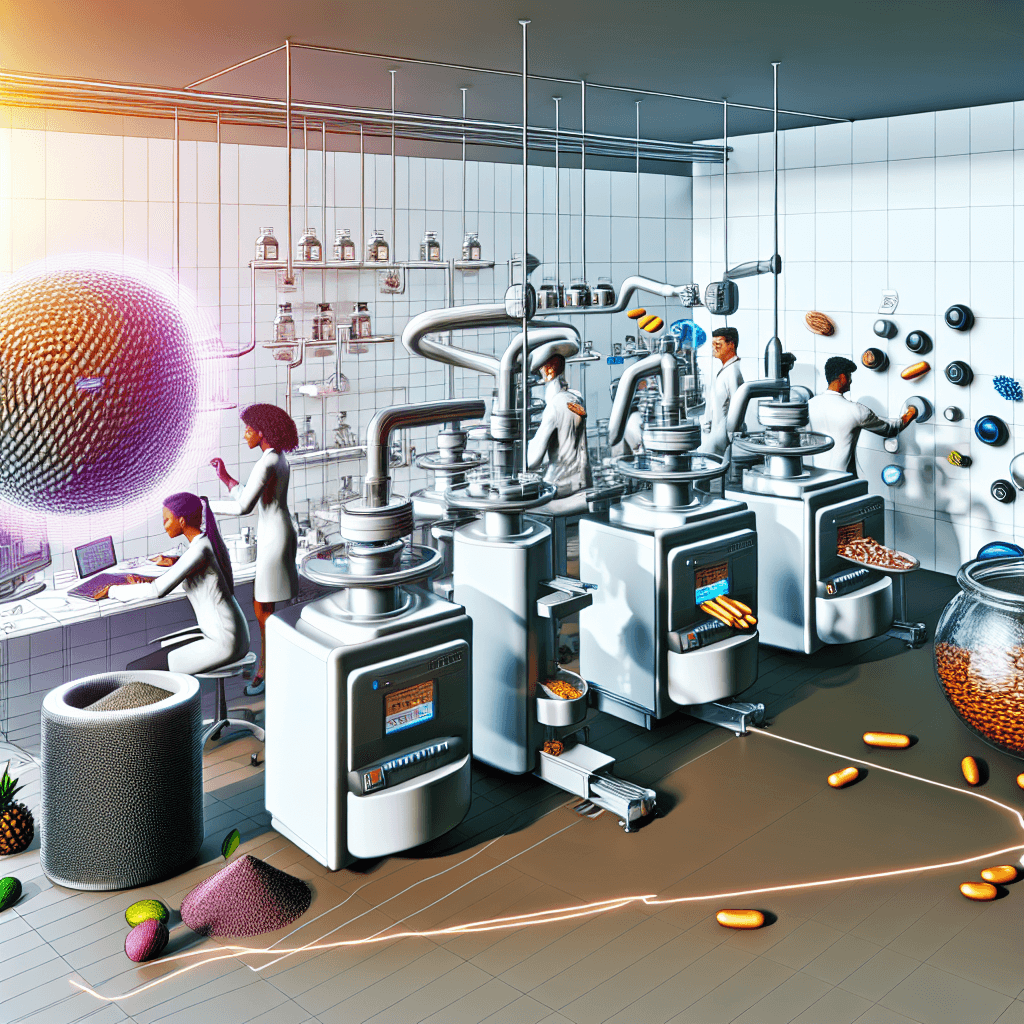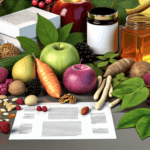Discover how technology is revolutionizing the nutraceutical industry, from ingredient sourcing to product formulation and delivery. #nutraceutical #technology #innovation
How Technology is Transforming Nutraceutical Product Development

Table of Contents
- Introduction
- The Role of Artificial Intelligence in Nutraceutical Product Development
- Advancements in Biotechnology and Their Impact on Nutraceuticals
- The Rise of Personalized Nutrition: How Technology is Changing the Game
- From Farm to Tablet: How Technology is Revolutionizing Nutraceutical Supply Chains
- Q&A
- Conclusion
“Revolutionizing health and wellness through cutting-edge technology in nutraceuticals.”
Introduction
Technology has been rapidly advancing in recent years, and its impact can be seen in almost every aspect of our lives. One area where technology has had a significant impact is in the development of nutraceutical products. Nutraceuticals, which are products derived from food sources with potential health benefits, have been gaining popularity in the health and wellness industry. With the help of technology, the process of developing and producing these products has been transformed, leading to more effective and innovative nutraceuticals. In this article, we will explore how technology is transforming nutraceutical product development and the benefits it brings to both producers and consumers.
The Role of Artificial Intelligence in Nutraceutical Product Development
The nutraceutical industry has been rapidly growing in recent years, with more and more consumers turning to these products for their health and wellness needs. As a result, there has been a significant increase in the demand for innovative and effective nutraceutical products. To meet this demand, the industry has turned to technology, specifically artificial intelligence (AI), to revolutionize the product development process.
AI is a branch of computer science that focuses on creating intelligent machines that can perform tasks that typically require human intelligence. In the context of nutraceutical product development, AI is being used to analyze vast amounts of data and make predictions and decisions based on that data. This technology has the potential to transform the industry in several ways.
One of the main benefits of using AI in nutraceutical product development is its ability to speed up the process. Traditionally, developing a new product can take years, as it involves extensive research, testing, and clinical trials. With AI, this process can be significantly shortened, as the technology can quickly analyze data and identify patterns and trends. This allows researchers to make informed decisions about which ingredients and formulations are most likely to be effective, saving both time and resources.
Moreover, AI can also improve the accuracy and effectiveness of product development. By analyzing large datasets, AI can identify potential interactions between ingredients and predict how they will affect the body. This can help researchers avoid potentially harmful combinations and create more targeted and effective products. Additionally, AI can also help identify new ingredients and formulations that may have previously been overlooked, leading to the development of more innovative and unique products.
Another significant advantage of using AI in nutraceutical product development is its ability to personalize products for individual consumers. With the rise of personalized medicine, consumers are increasingly looking for products that are tailored to their specific needs and health goals. AI can analyze an individual’s health data, such as genetic information and lifestyle habits, to create personalized recommendations for nutraceutical products. This not only improves the effectiveness of the product but also enhances the overall customer experience.
Furthermore, AI can also play a crucial role in quality control and safety in the nutraceutical industry. By analyzing data from various sources, including clinical trials and adverse event reports, AI can identify potential safety concerns and help companies make informed decisions about their products. This can help prevent the release of unsafe products and protect consumers from potential harm.
However, the use of AI in nutraceutical product development is not without its challenges. One of the main concerns is the lack of regulation and standardization in the industry. As AI continues to evolve and become more prevalent in product development, there is a need for clear guidelines and regulations to ensure the safety and effectiveness of these products. Additionally, there is also a concern about the potential bias in AI algorithms, which could lead to the development of products that are not suitable for certain populations.
In conclusion, the role of AI in nutraceutical product development is rapidly expanding, and its potential to transform the industry is significant. From speeding up the process to improving accuracy and personalization, AI has the potential to revolutionize the way nutraceutical products are developed and consumed. However, it is essential to address the challenges and concerns surrounding its use to ensure the safety and effectiveness of these products. As technology continues to advance, it is clear that AI will play a crucial role in shaping the future of the nutraceutical industry.
Advancements in Biotechnology and Their Impact on Nutraceuticals

In recent years, there has been a significant shift in the way nutraceutical products are developed and brought to market. This shift can be attributed to the advancements in biotechnology, which have revolutionized the nutraceutical industry. Biotechnology, which involves the use of living organisms or their components to create or modify products, has opened up new possibilities for the development of nutraceuticals. In this article, we will explore how technology is transforming nutraceutical product development and the impact it has on the industry.
One of the most significant ways technology has transformed nutraceutical product development is through the use of genetic engineering. This process involves altering the genetic makeup of an organism to produce desired traits. In the nutraceutical industry, genetic engineering has been used to create plants with enhanced nutritional value, such as higher levels of vitamins and minerals. This has led to the development of nutraceutical products with increased potency and effectiveness.
Another area where technology has made a significant impact is in the extraction and purification of active ingredients from natural sources. Traditionally, nutraceutical manufacturers relied on manual extraction methods, which were time-consuming and often resulted in low yields. However, with the use of advanced technologies such as supercritical fluid extraction and high-performance liquid chromatography, manufacturers can now extract and purify active ingredients more efficiently and effectively. This has not only improved the quality of nutraceutical products but also reduced production costs.
In addition to genetic engineering and extraction technologies, advancements in biotechnology have also led to the development of new delivery systems for nutraceuticals. One such system is nanotechnology, which involves the manipulation of particles at the nanoscale level. Nanotechnology has been used to create nanoemulsions, which are tiny droplets of oil dispersed in water. These nanoemulsions have been shown to improve the absorption and bioavailability of nutraceuticals, making them more effective in delivering their intended health benefits.
Furthermore, technology has also played a crucial role in the development of personalized nutraceutical products. With the use of genetic testing and data analysis, manufacturers can now create customized nutraceuticals tailored to an individual’s specific genetic makeup and health needs. This has opened up new possibilities for personalized nutrition and preventive healthcare, as nutraceuticals can now be formulated to address specific health concerns and deficiencies.
Apart from advancements in biotechnology, technology has also transformed the way nutraceutical products are marketed and sold. With the rise of e-commerce and social media, nutraceutical manufacturers can now reach a wider audience and promote their products more effectively. This has led to increased consumer awareness and demand for nutraceuticals, driving the growth of the industry.
However, with all these advancements, there are also concerns about the safety and regulation of nutraceutical products. As technology continues to evolve, so do the methods used to develop and market nutraceuticals. This has led to a need for stricter regulations and guidelines to ensure the safety and efficacy of these products. Governments and regulatory bodies are now working towards establishing standards for the development, production, and marketing of nutraceuticals to protect consumers and maintain the integrity of the industry.
In conclusion, technology has had a profound impact on nutraceutical product development, from the extraction and purification of active ingredients to the creation of personalized products. These advancements have not only improved the quality and effectiveness of nutraceuticals but also opened up new possibilities for personalized nutrition and preventive healthcare. However, with these advancements come the need for stricter regulations to ensure the safety and efficacy of these products. As technology continues to evolve, we can expect to see further transformations in the nutraceutical industry, making it an exciting and dynamic field to watch.
The Rise of Personalized Nutrition: How Technology is Changing the Game
In recent years, there has been a significant shift in the way we approach nutrition and wellness. With the rise of technology, the field of nutraceutical product development has undergone a transformation, paving the way for personalized nutrition. This shift has been driven by advancements in technology, which have allowed for a deeper understanding of individual health needs and the development of tailored solutions. In this article, we will explore how technology is changing the game in the world of personalized nutrition.
One of the key ways in which technology is transforming nutraceutical product development is through the use of data and analytics. With the help of wearable devices, mobile apps, and other tracking tools, individuals can now collect and analyze data about their health and wellness in real-time. This data includes information such as physical activity, sleep patterns, and dietary habits. By leveraging this data, nutraceutical companies can gain valuable insights into the specific needs and preferences of their customers.
This data-driven approach has also led to the development of personalized nutrition plans. By analyzing an individual’s data, nutraceutical companies can create customized supplement regimens that are tailored to their unique needs. For example, someone who is deficient in a particular vitamin or mineral can be recommended a supplement that specifically targets that deficiency. This personalized approach not only ensures that individuals are getting the nutrients they need, but it also eliminates the guesswork and trial-and-error often associated with traditional supplement use.
Another way in which technology is changing the game in personalized nutrition is through the use of genetic testing. With the advancements in genetic testing technology, individuals can now get a detailed analysis of their DNA and how it relates to their health. This information can be used to identify genetic predispositions and potential deficiencies, allowing for a more targeted and personalized approach to nutrition. Nutraceutical companies can use this information to develop supplements that are specifically designed to address these genetic factors, providing individuals with a more effective and personalized solution.
In addition to data and genetic testing, technology has also played a significant role in the development of new delivery methods for nutraceutical products. Traditionally, supplements have been available in pill or capsule form, which can be challenging for some individuals to swallow. However, with the advancements in technology, nutraceutical companies have been able to develop alternative delivery methods such as gummies, powders, and even patches. These options not only make it easier for individuals to consume their supplements, but they also provide a more enjoyable and convenient experience.
Furthermore, technology has also enabled nutraceutical companies to improve the quality and efficacy of their products. With the use of advanced manufacturing processes and quality control measures, companies can ensure that their products are of the highest quality and purity. This is especially important in the world of personalized nutrition, where individuals may have specific dietary restrictions or sensitivities. By leveraging technology, nutraceutical companies can develop products that are free from allergens and contaminants, providing individuals with safe and effective options for their health and wellness needs.
In conclusion, technology has had a profound impact on the field of nutraceutical product development, particularly in the realm of personalized nutrition. From data and analytics to genetic testing and innovative delivery methods, technology has revolutionized the way we approach nutrition and wellness. As technology continues to advance, we can expect to see even more personalized and effective solutions for individuals looking to optimize their health and well-being.
From Farm to Tablet: How Technology is Revolutionizing Nutraceutical Supply Chains
In recent years, the nutraceutical industry has experienced significant growth, with consumers increasingly turning to natural and plant-based products for their health and wellness needs. This has led to a surge in demand for nutraceutical products, and as a result, the industry has had to adapt and evolve to keep up with this demand. One of the key ways in which the nutraceutical industry is transforming is through the use of technology in product development, particularly in the supply chain from farm to tablet.
Traditionally, the process of developing nutraceutical products involved a long and complex supply chain, with multiple intermediaries involved in the production and distribution of these products. This often resulted in a lack of transparency and traceability, making it difficult for consumers to know exactly where their products came from and how they were produced. However, with the advancements in technology, this is all changing.
One of the key ways in which technology is transforming the nutraceutical supply chain is through the use of precision agriculture. This involves the use of sensors, drones, and other advanced technologies to collect data on soil conditions, weather patterns, and crop health. This data is then used to optimize farming practices, resulting in higher yields and better quality crops. This not only benefits the farmers but also ensures that the raw materials used in nutraceutical products are of the highest quality.
Another area where technology is making a significant impact is in the processing and manufacturing of nutraceutical products. With the use of automation and robotics, the production process has become more efficient and streamlined, reducing the risk of human error and contamination. This has also led to a reduction in production costs, making nutraceutical products more affordable for consumers.
In addition to improving efficiency, technology is also playing a crucial role in ensuring the safety and quality of nutraceutical products. With the use of blockchain technology, companies can now track and trace every step of the supply chain, from the farm to the final product. This not only provides transparency for consumers but also helps to prevent fraud and ensure that products are free from harmful substances.
Furthermore, technology is also enabling nutraceutical companies to develop more personalized products for their consumers. With the use of artificial intelligence and machine learning, companies can analyze vast amounts of data on consumer preferences and health needs. This allows them to create tailored products that meet the specific needs of their target market, resulting in higher customer satisfaction and loyalty.
Another significant development in the nutraceutical industry is the use of 3D printing technology. This has revolutionized the production of supplements and other nutraceutical products, allowing for more precise dosing and customization. With 3D printing, companies can also create complex and unique shapes and designs for their products, making them more appealing to consumers.
Technology is also transforming the way nutraceutical products are marketed and sold. With the rise of e-commerce and social media, companies can now reach a wider audience and promote their products more effectively. This has also led to the emergence of direct-to-consumer models, where companies can sell their products directly to consumers, cutting out intermediaries and reducing costs.
In conclusion, technology is playing a crucial role in transforming the nutraceutical industry, particularly in the supply chain from farm to tablet. From precision agriculture to 3D printing and e-commerce, technology is improving efficiency, safety, and customization in the production and distribution of nutraceutical products. As technology continues to advance, we can expect to see even more significant changes in the nutraceutical industry, making it more accessible and beneficial for consumers.
Q&A
1. How has technology impacted the development of nutraceutical products?
Technology has greatly impacted the development of nutraceutical products by allowing for more precise and efficient research and development processes. With the use of advanced tools and techniques, scientists are able to identify and extract beneficial compounds from natural sources, create new formulations, and test the efficacy and safety of these products.
2. What are some specific examples of how technology has transformed nutraceutical product development?
Some specific examples of how technology has transformed nutraceutical product development include the use of high-throughput screening methods to identify potential active ingredients, the development of advanced delivery systems such as nano-encapsulation, and the use of artificial intelligence and machine learning to analyze large amounts of data and predict the effectiveness of certain ingredients.
3. How has technology improved the quality and safety of nutraceutical products?
Technology has improved the quality and safety of nutraceutical products by allowing for more precise and accurate testing methods. This ensures that the products contain the intended ingredients in the correct amounts and are free from contaminants. Additionally, technology has also enabled better tracking and monitoring of the supply chain, ensuring that products are produced and stored in optimal conditions.
4. What role does technology play in the future of nutraceutical product development?
Technology will continue to play a crucial role in the future of nutraceutical product development. With advancements in areas such as biotechnology, nanotechnology, and data analysis, we can expect to see even more innovative and effective nutraceutical products being developed. Technology will also play a key role in improving the accessibility and affordability of these products, making them more widely available to consumers.
Conclusion
In conclusion, technology has greatly transformed the nutraceutical product development industry. With the advancements in technology, researchers and manufacturers are able to create more effective and innovative products that cater to the specific needs and preferences of consumers. From the use of artificial intelligence and machine learning to develop personalized supplements, to the utilization of advanced manufacturing processes for better quality control, technology has revolutionized the way nutraceutical products are developed and produced. This has not only improved the overall quality and efficacy of these products, but also increased their accessibility and affordability for consumers. As technology continues to evolve, we can expect to see even more advancements in nutraceutical product development, leading to a healthier and more personalized approach to nutrition and wellness.








